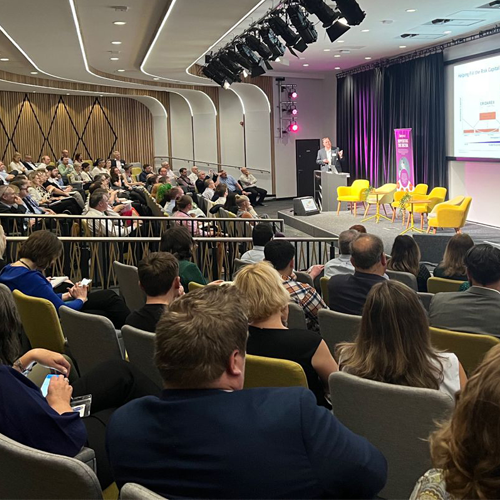BioFocus 2023: A day of innovation

The Catalyst at Newcastle Helix saw a bumper turnout with 166 delegates, speakers and panelists, plus 12 exhibitors, all discussing, sharing and learning about the latest technologies, innovations, key sector initiatives, and funding opportunities.
The event was held in conjunction with a very well-attended special session of the popular Biotech & Beers networking events, which took place at a local venue the night before and was an excellent opportunity for out of town conference attendees to meet with colleagues from Newcastle and the wider North East, and to break the ice in an informal setting ahead of BioFocus.
As usual, the agenda provided great food for thought, with experts from the life sciences sector sharing their thoughts on topics including the state of the North East region within a national context, developments in diagnostics, regional expertise and the therapies of the future.
The delegates also heard from two keynote speakers: Epidarex Managing Partner, Sinclair Dunlop and Innovate UK’s Director of Health & Life Sciences, Richard Hebdon.
The first of the keynotes spoke from a venture capital (VC) perspective, focusing on scaling early-stage capital to maximise the impact of life science innovation. The presentation first examined the changing face of global healthcare, identifying the key areas of an ageing population and its associated health issues, increased understanding of human disease and externalising corporate R&D via VC-backed assets. The rise of non-communicable diseases such as diabetes, cancer and heart disease, which caused 74% of global deaths in 2022, was also touched upon and the need for innovation in these areas in the face of falling R&D returns was emphasised.
Following this theme, innovation trends driving growth in the sector were also identified, including cell and gene therapies, orphan drugs, immuno-oncology and digital health. Further future trends pointed towards novel neurodegenerative disease therapies, AI, regenerative medicine and connected medical devices.
The keynote also highlighted the importance of VC-backed pharma pipelines, with 42% of approved drugs now originating from such deals, with return on investment (ROI) in healthcare outperforming all other sectors long-term. This along with access to scalable risk capital, a high quality research base generating novel IP, entrepreneurial talent, and policies to encourage innovation were all mentioned as key to sustaining future development within the sector.
The theme of the second and final presentation focused on building on the government’s life sciences vision by delivering world-class impacts through business innovation. The keynote first discussed the health and economic challenges faced by the UK, including those that have been exacerbated by the pandemic, and, as with the first presentation, emphasised the importance of innovation within life sciences. It was also mentioned that to support this, the government has committed to increasing total UK research and development investment (public and private) to £22 billion a year (equivalent to 2.4% of GDP) by 2027, with the vision of the UK as a global hub for innovation by 2035.
The presentation looked at the future economy with strategic focus on specific areas, including Net Zero emissions and digital technologies, and healthy living, which specified the management and reduction of chronic disease, promoting healthier lifestyle choices, developing precision medicine to predict future disease, and providing impactful healthcare innovations. It was added that to support this, the government, sector and NHS published the Life Science Vision in 2021. Several Missions were identified by the report and designed to tackle the leading causes of morbidity and mortality in the UK, including dementia translational research, early cancer diagnosis and treatment, novel vaccine development, improved mental health research and the mitigation of cardiovascular diseases and its major risk factors, including obesity.
The keynote concluded with a takeaway for the delegates regarding the future of healthcare: What will it look like 15 years from now? What will have changed? What new technologies will be available? How will healthcare be delivered?
Bionow’s Executive Director of Business Development, Stella James, commented: “It was great to see so many come together to connect, engage, benefit, and grow. Innovation is at the heart of the life sciences industry, so it was inspiring to hear about so many exciting opportunities for development and collaboration available locally and nationally both now and in the future.”
BioFocus 2023 is supported by the Academic Health Science Network for the North East and North Cumbria, the National Horizons Centre and the North East Local Enterprise Partnership.

























